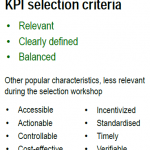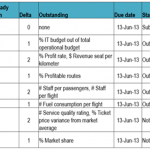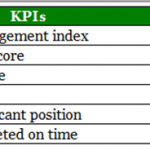Top six reasons to start using key performance indicators

Measurement is an activity which emerged thousands of years ago, driven by the human curiosity to know more about the environment and to understand how the world works. In time, our world has evolved to become more and more complex, pressuring us to constantly refine our measurement tools and techniques.
Today, we see organizations as ecosystems and we act accordingly to our desire to know more and to better understand this environment. Nowadays, challenges are not about accessing information, as most companies are managing large volumes of data. The challenge is to decide what data is the most important for decision making? In this context, key performance indicators (KPIs) are very useful tools to provide:
Clarity
KPIs provide a detailed numerical view the desired results. Based on their selected targets, KPIs clearly reveal the state of performance. Furthermore, alignment is facilitated by mapping contribution to success across all organizational levels. Key performance indicators showcase what must be achieved, and at what levels, in order to achieve the organizational strategy.
Focus
In a business world flooded by data and information, knowing on what to concentrate is essential. KPIs, through their own nature, reflect what is relevant for the organization – what matters the most. This way, resources can be allocated more efficiently.
By monitoring KPI results, managers are able to focus on those area that are underperforming and even to have a proactive approach by taking corrective actions to keep results close to targets.
Improvement
The first step towards improvement is acknowledging the current state of performance. KPIs allow an objective evaluation of the performance level and outline the necessity to take actions that ensure targets are achieved.
Engagement
KPIs drive engagement through a sense of ownership and responsibility for reaching targets. By assigning accountability for each KPI, employees become more committed and motivated to achieve the desired performance levels. Engagement also contributes to building a performance culture which has a significant contribution to the success or failure of any performance management system.
Communication
Providing a common understanding of the organizational performance is essential to efficient business management. KPIs can be regarded as communication tools that help bring all stakeholders on the same page and enhance transparency. Deploying KPIs also demonstrates the interest and ability to use state of the art management concepts, thus providing credibility.
Learning
By measuring and analyzing KPI results, managers gain a better understanding on how business works. KPIs enable the comparison of results in time, they reflect trends, identify patterns and maximize the value of data through predictive analytics. Comparisons can also be done between competitors through benchmarking studies.

Tags: Ask the Experts, KPI






Ibrahim Saig
| #
I used to believe other values are implemented in considering efficient use of KPI as the Integrity and service excellence. Sometimes in medical fields other cross functional KPI could overlap as financial and medical objectives where we had critical gear to control it.
Reply
Performance Magazine KPIs every mobile game studio needs to track - Performance Magazine
| #
[…] the most relevant for decision making. In other words, a game studio should focus on selecting and using Key Performance Indicators (KPIs) that best reflect how they’re performing with meeting their goals. What success implies can be […]
Reply
Performance Magazine What Is a Key Performance Indicator (KPI)? Definition, Resources, and 1000+ Examples
| #
[…] Top Six Reasons to Start Using Key Performance Indicators […]
Reply
Performance Magazine Practitioner interview: Nancy Khalil on empowering the strategy department
| #
[…] planning and KPI usage are the mechanisms of every improvement that can ever be desired. In fact, what is not measured can […]
Reply
FiverrEarn
| #
FiverrEarn
[…]very handful of internet websites that occur to be comprehensive beneath, from our point of view are undoubtedly well worth checking out[…]
Reply
Pascoe Giles
| #
What’s up, yes this article is truly pleasant and I have learned lot of things from it regarding blogging.thanks.My blog post – frun-test.sakura.ne.jp
Reply